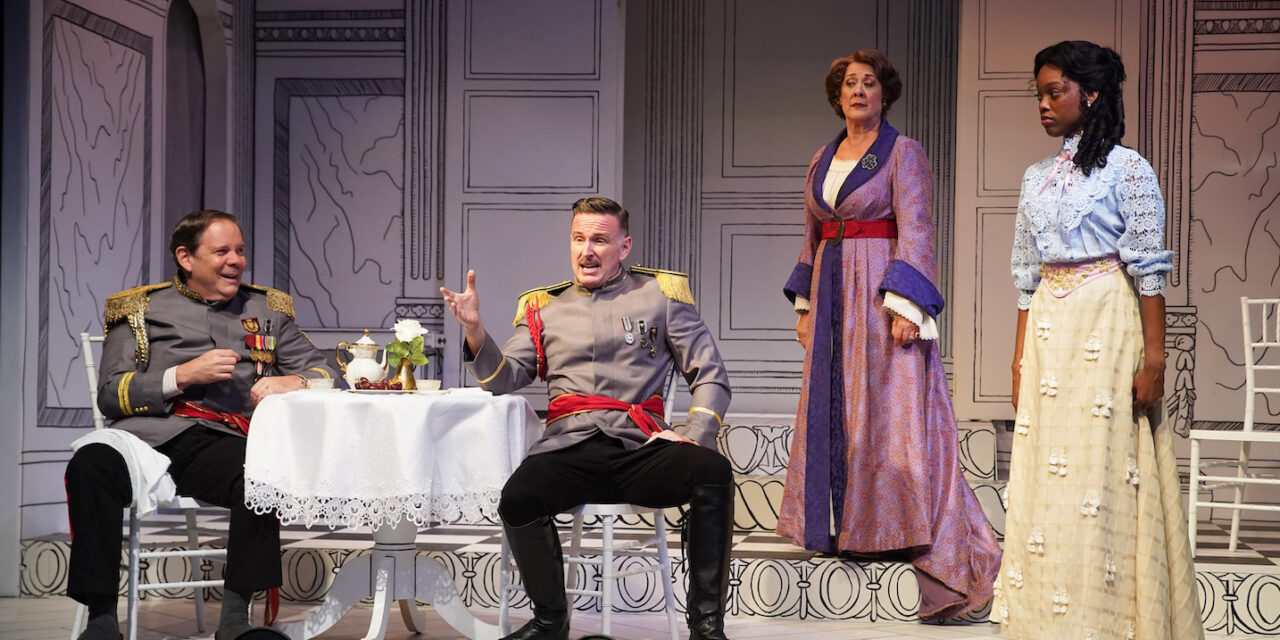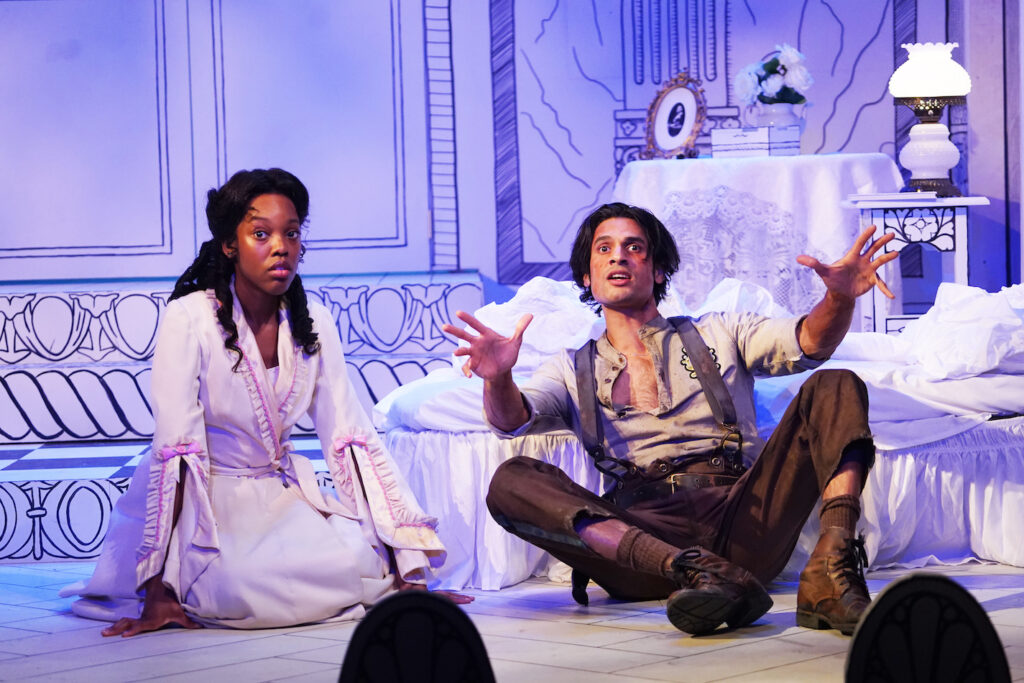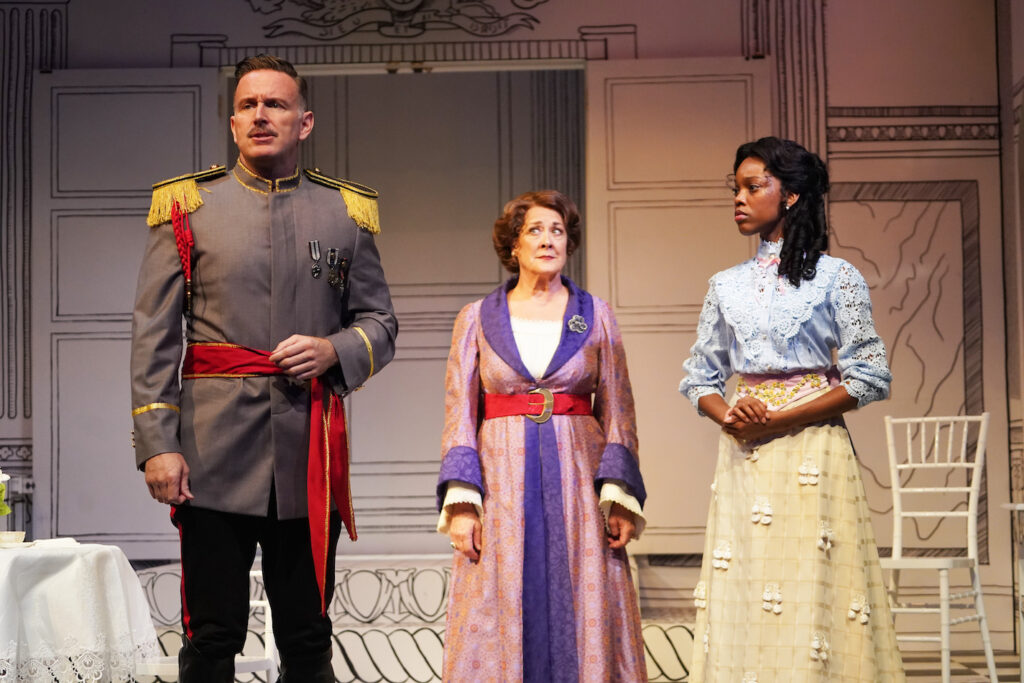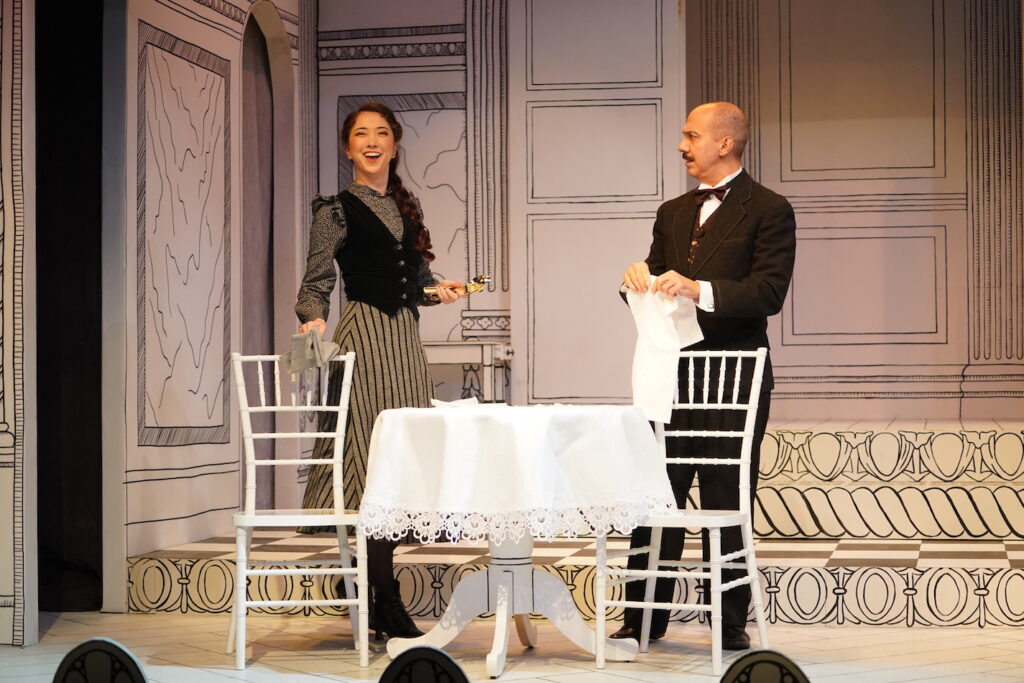
A play about war. Really? Bombarded, of late, with news blasts about Russia/Ukraine and most recently Israel/Hamas, I wondered what insights about war George Bernard Shaw’s Arms and the Man—now playing at Theater Row—could reveal. Thankfully, upon entering the theater, the set design transported me to the play’s period with elegant line drawings of a Victorian-era manor’s boudoir. And then the play began, with the cast speaking to the audience about the play, about Shaw, about the scenes—acting as hosts, not merely actors. I was disarmed. I said to myself: well, this is different.
Produced by the Gingold Theatrical Group as part of its ongoing, multi-year, presentation of George Bernard Shaw’s plays, Arms and the Man showcases Shaw’s humanist ideals. It is the group’s ethos to present Shavian works that align with Shaw’s dedication to the betterment of the individual and society.

David Staller’s direction was masterful. His decision to have the cast introduce the play established the performance’s collegial tone, set selection and staging (Lindsay G. Fuori, scenic design); and the costumes (Tracy Christensen) all captured the period from the play’s debut. For two hours I didn’t think about any other wars than the now-forgotten Serbo-Bulgarian conflict that informed the play.
Shaw wrote that “war [is] a hollow sham.” His formula for military success was: only attack with an advantage—no advantage, avoid the fight; and never fight if both sides are equal. Quite the case for global equality.
Other Shavian themes, self-determinism and feminism, are presented in the characters of daughter Raina Petkoff (Shanel Bailey) and servant Louka (Delphi Borich). Both are unhappy with their places in society and they hope to rise up to assert their independence and individuality. Raina, engaged to marry Major Sergius Saranoff (Ben Davis), admits that she is frustrated with familial expectations. She breaks with convention by aiding a fleeing enemy soldier, Captain Bluntschli (Keshav Moodlair), who arrives via her balcony. She falls hard and fast for his odd beliefs that good soldiers avoid fighting at all costs and always carry chocolate treats for breaks in fighting. Unconventional, perhaps, but appealing enough to help her to break away from her familial role. She and her mother, Catherine Petkoff (Karen Ziemba) help the chocolate cream soldier escape and bond over their shared secret.

In the next scene, in the manor’s garden, we learn that the war is over. The cause is dimly recalled. Shaw provides additional proof of the folly of war, as an ill-considered cavalry charge has triumphed against a line of artillery to win the war. Luckily, the artillery lacked ammunition. (A precursor to supply-line issues.) A peace is brokered, but not a commitment to reconcile as friends, leaving open the possibility of renewed hostilities. Major Paul Petkoff (Thomas Jay Ryan) returns victorious. Leader of the ill-advised cavalry charge, Major Sergius Saranoff, returns an inadvertent hero. Major Petkoff reclines comfortably into his standing as lord of the manor. Mother Petkoff is heartened that Raina’s marriage to the now “hero” Sergius will increase the family’s standing. But Sergius is conflicted. His heroism diminished due to the application of military best practices—i.e. do not lead a charge on horseback against machine guns. Although engaged to Raina, he also has strong feelings for the delightful Louka, whose flirtations snare him. She puts Sergius on notice and shares her desire to rise above her station. Separately, Louka shares her aspirations with fellow servant Nicola (Evan Zes,) who also has plans beyond serving tea and announcing visitors. The downstairs help wants to move out of the basement.

In the final scene, the return of the chocolate cream soldier (in a borrowed coat) reveals secrets and truths; and of course, this being a Shaw play, emotional growth. Through it all there is Shavian humor and plot devices that entertain. Sergius bemoans that “Everything I think I am, I’m mocked by what I do.” Captain Bluntschli offers to bring a machine gun to a duel. A library as status symbol boasts twelve books. Money isn’t all that important but it is welcome. All characters experience transformation from their initial appearances. This reflects Shaw’s belief that people need to be true to themselves to pursue what they want to be happy.
All the actors had that mischievous wink that signals “This is all in good fun.” Their performances captured the slightly over-the-top bravado that was a staple of the play’s music hall origins. Sergius bellows “Life is a farce!” There were winks and side-eyes aplenty. Nicola’s entrances and exits always brought a giggle. Although the stage was small, the seven actors managed to move gracefully up and down risers and around sparse furniture confidently.
As the cast returned finally to say their goodbyes, I said to myself: well, that was lovely.
Arms and the Man. Through November 18 at Theatre Row (410 West 42nd Street, between Ninth and Tenth Avenues). One hour, 45 minutes with one intermission. www.bfany.org
Photos: Carol Rosegg
Cover Photo Caption: Thomas Jay Ryan, Ben Davis, Karen Ziemba & Shanel Bailey

